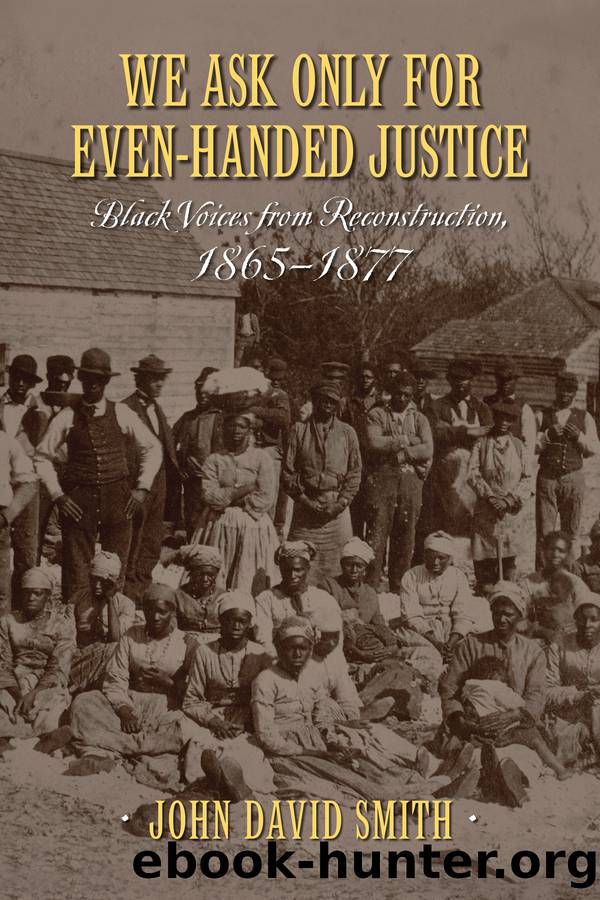We Ask Only for Even-Handed Justice by John David Smith

Author:John David Smith
Language: eng
Format: epub
ISBN: 9781613763070
Publisher: University of Massachusetts Press
The Reconstruction Act of March 2, 1867, imposed black suffrage on the former Confederate states and inaugurated the freedmenâs participation in politics. Alfred R. Waud, âThe First Vote,â Harperâs Weekly, November 16, 1867, p. 721 (authorâs collection).
The Southâs freedmen became enfranchised thanks to the first Reconstruction Act of March 2, 1867. Whereas some white Southerners were disqualified from voting (those persons who had held public office before the war and who then sided with the Confederates, along with some high-ranking Confederate officials; their status remained to be determined by the then-unrevised state constitutions), black Southerners were permitted to vote in elections for the various state constitutional conventions. Throughout the South, agents of the Freedmenâs Bureau registered black voters, and the freedmen prepared to vote for the first time. Genuine democracy seemed to lie on the horizon.
Led by black teachers and ministers from the North, the freedpeople and their white Unionist friends held mass meetings, barbecues, and parades to learn about the political process and to celebrate this special moment. The ex-slaves had a seemingly insatiable appetite for voting. By the end of 1867, some 700,000 blacks, in contrast to 660,000 whites, were registered to vote. Black voters played an important role in electing Republican Ulysses S. Grant president in the election of 1868.
While applauding the blacksâ new political opportunities, the editor of the New Orleans Tribune cautioned his readers not to seek vengeance against whites. He questioned the wisdom of denying former Confederates the right to vote. To be sure, the courts should deny the vote to men convicted of war crimes. But exhibiting much prescience, the editor considered disenfranchisement a dangerous precedent, one that might someday be used against the blacks. Instead of depriving whites of the vote, then, blacks should stand committed to âequal liberties and equal rights.â
We want the suffrage and the eligibilityâno distinctions in office nor in officers. We want to elect colored justices and colored members of the General Assembly in parishes where meritorious candidates from the African race, can get a majority. But we want to fight that political contest squarely and fairly, . . . and not by . . . suppressing the minority.
We shall not jeopardize our claims to political rights by denying those rights to any class of citizens as a class. Every man, in a community, has interests to protect. Oppression grows from the permanent disfranchisement of a class of the people. We have suffered oppression, and we do not ask to throw off the yoke to put it on the shoulders of others. Our republic must be grand and pure, and while majorities shall rule, minorities must have a voice.6
Download
This site does not store any files on its server. We only index and link to content provided by other sites. Please contact the content providers to delete copyright contents if any and email us, we'll remove relevant links or contents immediately.
| General | Discrimination & Racism |
Nudge - Improving Decisions about Health, Wealth, and Happiness by Thaler Sunstein(6651)
iGen by Jean M. Twenge(4710)
The Fire Next Time by James Baldwin(4357)
Adulting by Kelly Williams Brown(3690)
The Sports Rules Book by Human Kinetics(3604)
The Hacking of the American Mind by Robert H. Lustig(3591)
The Ethical Slut by Janet W. Hardy(3523)
Captivate by Vanessa Van Edwards(3312)
Mummy Knew by Lisa James(3177)
In a Sunburned Country by Bill Bryson(2957)
The Worm at the Core by Sheldon Solomon(2936)
Ants Among Elephants by Sujatha Gidla(2933)
Suicide: A Study in Sociology by Emile Durkheim(2617)
The Slow Fix: Solve Problems, Work Smarter, and Live Better In a World Addicted to Speed by Carl Honore(2581)
Humans of New York by Brandon Stanton(2385)
Handbook of Forensic Sociology and Psychology by Stephen J. Morewitz & Mark L. Goldstein(2382)
Blackwell Companion to Sociology, The by Judith R. Blau(2322)
The Happy Hooker by Xaviera Hollander(2278)
Outliers by Malcolm Gladwell(2268)
